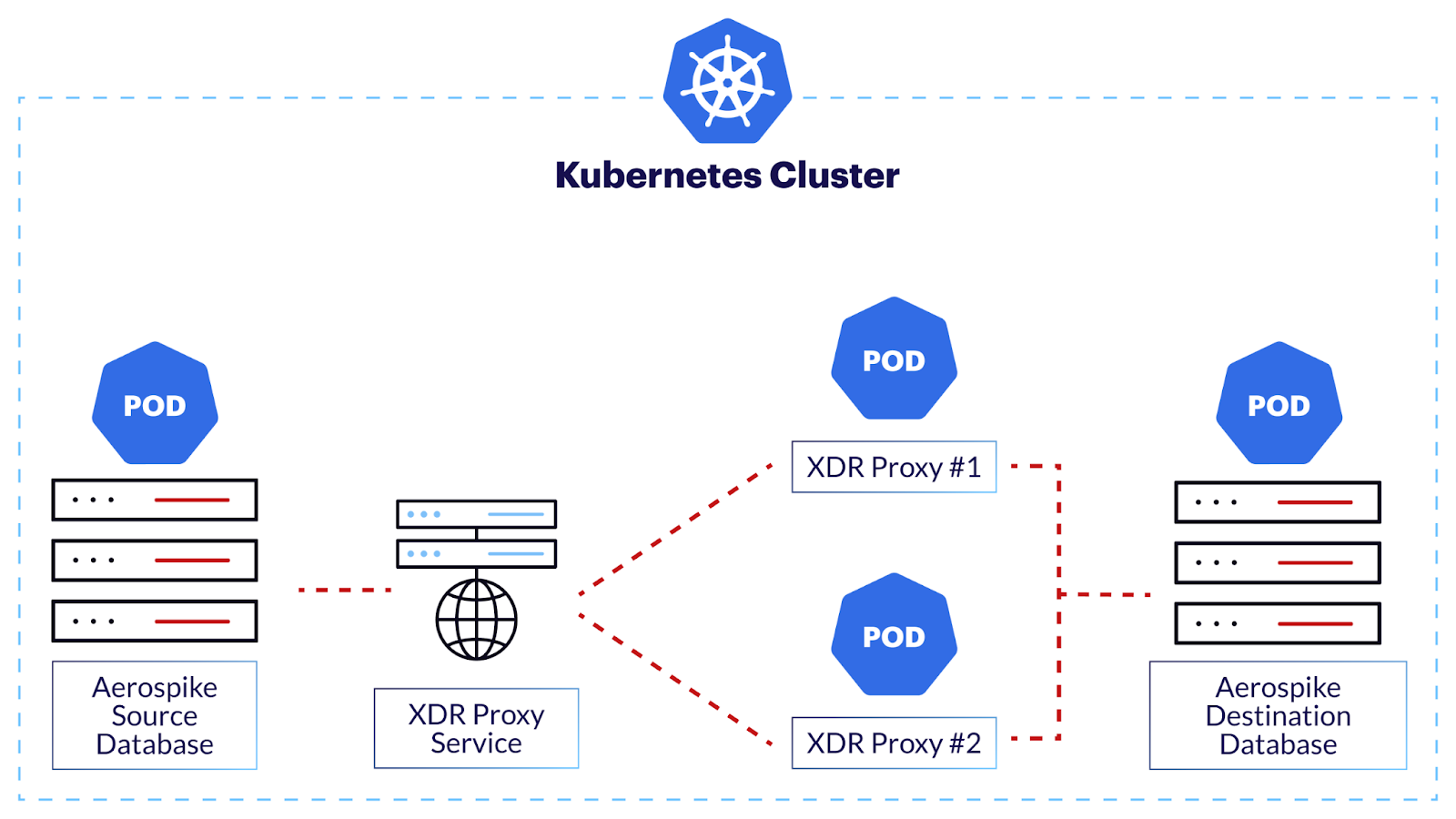How to use the Kubernetes Operator to establish connectivity between clusters
Discover how Aerospike's Cross Datacenter Replication feature (XDR) transfers data between clusters effortlessly.
This post outlines how to establish connectivity between two Aerospike clusters by leveraging Aerospike's Cross Datacenter Replication (XDR) feature to seamlessly transmit data from a source cluster to a destination cluster, providing high availability for critical data systems.
Ensuring network visibility for Aerospike service ports in the remote data center from a source cluster is crucial. However, this can pose challenges, especially in a Kubernetes environment. Fortunately, there is a solution: deploying a proxy server in front of the private Kubernetes destination cluster. To showcase this solution, we recommend installing the Kubernetes Operator to facilitate the creation and scheduling of the source and destination databases. While the demonstration is on setting up replication in one direction, it's worth noting that Aerospike supports active-active replication. This is accompanied by a conflict resolution mechanism to handle update clashes. This XDR proxy also supports this feature as well.
Let's begin the process.

Fig. 1 Aerospike Kubernetes Operator
The following Kubernetes nodes have been created using EKS.
First, display the following private and public IP addresses from listing the nodes with the kubectl command.
kubectl get nodes -o wideNAME STATUS ROLES AGE VERSION INTERNAL-IP EXTERNAL-IP OS-IMAGE KERNEL-VERSION CONTAINER-RUNTIME
ip-192-168-11-132.ec2.internal Ready <none> 2m53s v1.22.15-eks-fb459a0 192.168.11.132 44.201.67.177 Amazon Linux 2 5.4.219-126.411.amzn2.x86_64 docker://20.10.17
ip-192-168-31-131.ec2.internal Ready <none> 2m52s v1.22.15-eks-fb459a0 192.168.31.131 44.192.83.79 Amazon Linux 2 5.4.219-126.411.amzn2.x86_64 docker://20.10.17
ip-192-168-41-140.ec2.internal Ready <none> 2m51s v1.22.15-eks-fb459a0 192.168.41.140 18.208.222.35 Amazon Linux 2 5.4.219-126.411.amzn2.x86_64 docker://20.10.17
ip-192-168-41-63.ec2.internal Ready <none> 2m51s v1.22.15-eks-fb459a0 192.168.41.63 54.173.138.131 Amazon Linux 2 5.4.219-126.411.amzn2.x86_64 docker://20.10.17
ip-192-168-59-220.ec2.internal Ready <none> 2m52s v1.22.15-eks-fb459a0 192.168.59.220 54.227.122.222 Amazon Linux 2 5.4.219-126.411.amzn2.x86_64 docker://20.10.17
ip-192-168-6-124.ec2.internal Ready <none> 2m51s v1.22.15-eks-fb459a0 192.168.6.124 35.174.60.1 Amazon Linux 2 5.4.219-126.411.amzn2.x86_64 docker://20.10.1Now, get a copy of the Aerospike git repo for the Kubernetes Operator.
git clone \ https://github.com/aerospike/aerospike-kubernetes-operator.git
cp features.conf \ aerospike-kubernetes-operator/config/samples/secrets/.Setup
Run the following commands in the order specified. Wait for the CSV “Succeeded phase” to appear after running this line. Initially, it might take between 30 seconds and a minute to show up.
kubectl get csv -n operators -wcd aerospike-kubernetes-operator/
kubectl apply -f config/samples/storage/eks_ssd_storage_class.yaml
curl -sL \
https://github.com/operator-framework/operator-lifecycle-manager/releases/download/v0.22.0/install.sh | bash -s v0.22.0
kubectl create -f \
https://operatorhub.io/install/aerospike-kubernetes-operator.yaml
kubectl get csv -n operators -w
cd..
git clone \ https://github.com/nareshmaharaj-consultant/kubernetes-anything
cd kubernetes-anything
./createNamespace.sh aerospike
cd ../aerospike-kubernetes-operator/
kubectl -n aerospike create secret generic aerospike-secret \
--from-file=config/samples/secrets
kubectl -n aerospike create secret generic auth-secret \
--from-literal=password='admin123'Destination Cluster
Use the following YAML configuration file for our destination cluster. Save the file and name it ssd1_xdr_dest_6.1_cluster_cr.yaml:
apiVersion: asdb.aerospike.com/v1beta1
kind: AerospikeCluster
metadata:
name: aerocluster-dest-xdr
namespace: aerospikespec:
size: 1
image: aerospike/aerospike-server-enterprise:6.1.0.2 storage:
filesystemVolumePolicy:
initMethod: deleteFiles
cascadeDelete: true
blockVolumePolicy:
cascadeDelete: true
volumes:
- name: workdir
aerospike:
path: /opt/aerospike
source:
persistentVolume:
storageClass: ssd
volumeMode: Filesystem
size: 1Gi
- name: ns
aerospike:
path: /opt/aerospike/data/
source:
persistentVolume:
storageClass: ssd
volumeMode: Filesystem
size: 1Gi
- name: aerospike-config-secret
source:
secret:
secretName: aerospike-secret
aerospike:
path: /etc/aerospike/secret podSpec:
multiPodPerHost: true aerospikeAccessControl:
roles:
- name: writer
privileges:
- read-write
- name: reader
privileges:
- read
users:
- name: admin
secretName: auth-secret
roles:
- sys-admin
- user-admin
- read-write
- name: xdr-writer
secretName: xdr-user-auth-secret
roles:
- writer aerospikeConfig:
service:
feature-key-file: /etc/aerospike/secret/features.conf
security: {}
network:
service:
port: 3000
fabric:
port: 3001
heartbeat:
port: 3002
namespaces:
- name: test
memory-size: 134217728
replication-factor: 1
storage-engine:
type: device
files:
- /opt/aerospike/data/test.dat
filesize: 1073741824
data-in-memory: trueNext, create the following Kubernetes resources for our Aerospike destination cluster:
XDR destination database user login credentials, as a Kubernetes secret
Destination database cluster using our YAML file named ssd1_xdr_dest_6.1_cluster_cr.yaml
export secret_auth_name=xdr-user-auth-secret
export password_secret=admin123
kubectl -n aerospike create secret generic $secret_auth_name \
--from-literal=password=$password_secret
kubectl create -f ssd1_xdr_dest_6.1_cluster_cr.yaml
kubectl -n aerospike get po -wYou should see the database pods up and running successfully.
kubectl get po -n aerospike -wNAME READY STATUS RESTARTS AGE
aerocluster-dest-xdr-0-0 0/1 Init:0/1 0 13s
aerocluster-dest-xdr-0-0 0/1 Init:0/1 0 18s
aerocluster-dest-xdr-0-0 0/1 PodInitializing 0 19s
aerocluster-dest-xdr-0-0 1/1 Running 0 24sXDR-Proxy
Next, set up the xdr-proxy. Take a brief look at Fig. 1 Aerospike Kubernetes Operator, and you’ll notice that we are working from the right to the left in that order.
Configuration
Create the following xdr-proxy configuration file. Replace the seed address with a fully qualified domain name (FQDN) for the destination database pod(s) you created earlier. Multiple seed addresses may be added (hint: recommended in production).
cd ..
mkdir -p xdr-cfg/etc/auth
cd xdr-cfg/etc/cat <<EOF> aerospike-xdr-proxy.yml
# Change the configuration for your use case.
# Naresh Maharaj
# Refer to https://www.aerospike.com/docs/connectors/enterprise/xdr-proxy/configuration/index.html
# for details.# The connector's listening ports, manage service, TLS, and network interface.
service:
port: 8901
# Aerospike Enterprise Server >= 5.0
manage:
address: 0.0.0.0
port: 8902# The destination aerospike cluster.
aerospike:
seeds:
- aerocluster-dest-xdr-0-0.aerospike.svc.cluster.local:
port: 3000
credentials:
username: xdr-writer
password-file: /etc/aerospike-xdr-proxy/auth/password_DC1.txt
auth-mode: internal# The logging config
logging:
enable-console-logging: true
file: /var/log/aerospike-xdr-proxy/aerospike-xdr-proxy.log
levels:
root: debug
record-parser: debug
server: debug
com.aerospike.connect: debug
# Ticker log interval in seconds
ticker-interval: 3600
EOFsudo tee auth/password_DC1.txt <<EOF
admin123
EOF
cd ..kubectl -n aerospike create configmap xdr-proxy-cfg --from-file=etc/
kubectl -n aerospike create secret generic xdr-proxy-auth-secret \
--from-file=etc/authDeployment
Now that you have the xdr-proxy configuration file created, produce the Kubernetes deployment YAML file for the xdr-proxy. The following YAML file is used to deploy the xdr-proxy pods, ideally in the same data center or location where the destination databases will be hosted.
Tip: Remember that your xdr-proxy configuration differs from the Kubernetes xdr-proxy deployment file.
cat <<EOF> xdr-proxy-deployment.yaml
apiVersion: apps/v1
kind: Deployment
metadata:
name: xdr-proxy
namespace: aerospike
labels:
app: xdr-proxy
spec:
replicas: 2
selector:
matchLabels:
app: xdr-proxy
template:
metadata:
labels:
app: xdr-proxy
spec:
containers:
- name: xdr-proxy
image: aerospike/aerospike-xdr-proxy:2.1.0
volumeMounts:
- name: xdr-proxy-dir
mountPath: "/etc/aerospike-xdr-proxy/"
readOnly: true
- name: xdr-auth-dir
mountPath: "/etc/aerospike-xdr-proxy/auth"
readOnly: true
ports:
- name: xdr-proxy-main
containerPort: 8901
- name: xdr-proxy-mng
containerPort: 8902
volumes:
- name: xdr-proxy-dir
configMap:
name: xdr-proxy-cfg
optional: false
- name: xdr-auth-dir
secret:
secretName: xdr-proxy-auth-secret
optional: false
---
apiVersion: v1
kind: Service
metadata:
name: xdr-proxy
namespace: aerospike
spec:
selector:
app: xdr-proxy
ports:
- name: main
protocol: TCP
port: 8901
targetPort: xdr-proxy-main
- name: manage
protocol: TCP
port: 8902
targetPort: xdr-proxy-mng
EOFkubectl create -f xdr-proxy-deployment.yaml
kubectl get po -n aerospike -wThe following command shows the current pods are running successfully. So far, so good!
kubectl get po -n aerospike -w
NAME READY STATUS RESTARTS AGE
aerocluster-dest-xdr-0-0 1/1 Running 0 77m
xdr-proxy-7d9fccd6c8-g5mjt 1/1 Running 0 2m26s
xdr-proxy-7d9fccd6c8-mjxp4 1/1 Running 0 2m26sSource cluster
Create the Aerospike source cluster using the following configuration. We will insert our sample messages here.
cd ../aerospike-kubernetes-operator/cat <<EOF> ssd1_xdr_src_6.1_cluster_cr.yaml
apiVersion: asdb.aerospike.com/v1beta1
kind: AerospikeCluster
metadata:
name: aerocluster-source-xdr
namespace: aerospikespec:
size: 1
image: aerospike/aerospike-server-enterprise:6.1.0.2 storage:
filesystemVolumePolicy:
initMethod: deleteFiles
cascadeDelete: true
blockVolumePolicy:
cascadeDelete: true
volumes:
- name: workdir
aerospike:
path: /opt/aerospike
source:
persistentVolume:
storageClass: ssd
volumeMode: Filesystem
size: 1Gi
- name: ns
aerospike:
path: /opt/aerospike/data/
source:
persistentVolume:
storageClass: ssd
volumeMode: Filesystem
size: 1Gi
- name: aerospike-config-secret
source:
secret:
secretName: aerospike-secret
aerospike:
path: /etc/aerospike/secret podSpec:
multiPodPerHost: true aerospikeAccessControl:
roles:
- name: writer
privileges:
- read-write
- name: reader
privileges:
- read
users:
- name: admin
secretName: auth-secret
roles:
- sys-admin
- user-admin
- read-write
aerospikeConfig:
service:
feature-key-file: /etc/aerospike/secret/features.conf
security: {}
network:
service:
port: 3000
fabric:
port: 3001
heartbeat:
port: 3002
xdr:
dcs:
- name: DC2
connector: true
node-address-ports:
- xdr-proxy.aerospike.svc.cluster.local 8901
namespaces:
- name: test
namespaces:
- name: test
memory-size: 134217728
replication-factor: 1
storage-engine:
type: device
files:
- /opt/aerospike/data/test.dat
filesize: 1073741824
data-in-memory: true
EOFkubectl create -f ssd1_xdr_src_6.1_cluster_cr.yaml
kubectl get po -n aerospike -wFrom the source cluster, confirm the XDR component has connected to the xdr-proxy by filtering the Kubernetes log file as shown in the following kubectl command.
kubectl -n aerospike logs aerocluster-source-xdr-0-0 -c aerospike-server | grep xdr | grep conn
Dec 08 2022 13:49:21 GMT: INFO (xdr): (dc.c:581) DC DC2 connected Oct 10 2022 13:57:53 GMT: INFO (xdr): (dc.c:581) DC DC2 connectedSimple message test
Add some sample messages to the source database and confirm they are being received in the destination database cluster. Start by getting the source database service address and connect using Aerospike's command line tool - AQL.
kubectl get svc -n aerospikeNAME TYPE CLUSTER-IP EXTERNAL-IP PORT(S) AGE
aerocluster-dest-xdr ClusterIP None <none> 3000/TCP 3h38m
aerocluster-dest-xdr-0-0 NodePort 10.100.226.179 <none> 3000:30168/TCP 3h38m
aerocluster-source-xdr ClusterIP None <none> 3000/TCP 33m
aerocluster-source-xdr-0-0 NodePort 10.100.116.173 <none> 3000:31999/TCP 33m
xdr-proxy ClusterIP 10.100.44.96 <none> 8901/TCP,8902/TCP 41mInsert a source record using the following command in AQL
kubectl run -it --rm --restart=Never aerospike-tool -n aerospike --image=aerospike/aerospike-tools:latest -- aql -U admin -P admin123 -h aerocluster-source-xdr-0-0insert into test.a1 (PK,a,b,c,d) values(1,"A","B","C","D")
OK, 1 record affected.aql> select * from test
+----+-----+-----+-----+-----+
| PK | a | b | c | d |
+----+-----+-----+-----+-----+
| 1 | "A" | "B" | "C" | "D" |
+----+-----+-----+-----+-----+
1 row in set (0.023 secs)Now, run the following select query in the destination cluster.
kubectl run -it --rm --restart=Never aerospike-tool -n aerospike --image=aerospike/aerospike-tools:latest -- aql -U admin -P admin123 -h aerocluster-dest-xdr-0-0aql> select * from test
+----+-----+-----+-----+-----+
| PK | a | b | c | d |
+----+-----+-----+-----+-----+
| 1 | "A" | "B" | "C" | "D" |
+----+-----+-----+-----+-----+
1 row in set (0.031 secs)OKInterim summary
At this point, it's confirmed that xdr-proxy is doing exactly what It should do.
If if you review the log file for the initial two xdr-proxies scheduled, you should see userKey=1.
kubectl logs xdr-proxy-7d9fccd6c8-5q7gn -n aerospike | grep record-parser
2022-12-08 14:53:50.607 GMT DEBUG record-parser - parsed message fields: key=Key(namespace='test', set=a1, digest=[120, 48, -23, -90, 110, 126, 84, -1, 114, -116, -9, -21, 28, 75, 126, -68, -51, 83, 31, -117], userKey=1, lastUpdateTimeMs=1670511230565, userKeyString=1, digestString='eDDppm5+VP9yjPfrHEt+vM1TH4s=')kubectl logs xdr-proxy-7d9fccd6c8-f5zkt -n aerospike | grep \
record-parser
(none)Scaling the XDR-Proxies
Go ahead and scale up the xdr-proxy to six pods by editing the file xdr-proxy-deployment.yaml and then apply the changes.
apiVersion: apps/v1
kind: Deployment
metadata:
name: xdr-proxy
namespace: aerospike
labels:
app: xdr-proxy
spec:
replicas: 6
selector:
matchLabels:
app: xdr-proxy
...
kubectl apply -f xdr-proxy-deployment.yamlYou can achieve exactly the same by running the following command.
kubectl scale deploy xdr-proxy -n aerospike --replicas=6
You should now have six instances of the xdr-proxies running.
kubectl get po -n aerospike -w
NAME READY STATUS RESTARTS AGE
aerocluster-dest-xdr-0-0 1/1 Running 0 3h50m
aerocluster-source-xdr-0-0 1/1 Running 0 75m
xdr-proxy-7d9fccd6c8-49ttl 1/1 Running 0 7s
xdr-proxy-7d9fccd6c8-5q7gn 1/1 Running 0 83m
xdr-proxy-7d9fccd6c8-c4j7k 1/1 Running 0 7s
xdr-proxy-7d9fccd6c8-f5zkt 1/1 Running 0 83m
xdr-proxy-7d9fccd6c8-lscbg 1/1 Running 0 7s
xdr-proxy-7d9fccd6c8-r56vs 1/1 Running 0 7sAdd some sample messages in the source cluster with primary keys 5, 6, and 7. Note that in Aerospike, a primary key serves as a unique identifier for a record within a specific set in a specific namespace. This key is a unique identifier for addressing the record for any operation.
aql> insert into test (PK,a,b) values (5,"A","B")
OK, 1 record affected.
aql> insert into test (PK,a,b) values (6,"A","B")
OK, 1 record affected.
aql> insert into test (PK,a,b) values (7,"A","B")
OK, 1 record affected.Notice how userKey=5, userKey=6, and userKey=7 have been shipped across to the newly scaled xdr-proxies. Run the commands below to see the same,
kubectl logs xdr-proxy-7d9fccd6c8-5q7gn -n aerospike | grep \
record-parser
2022-12-08 14:53:50.607 GMT DEBUG record-parser - parsed message fields: key=Key(namespace='test', set=a1, digest=[120, 48, -23, -90, 110, 126, 84, -1, 114, -116, -9, -21, 28, 75, 126, -68, -51, 83, 31, -117], userKey=1, lastUpdateTimeMs=1670511230565, userKeyString=1, digestString='eDDppm5+VP9yjPfrHEt+vM1TH4s=')kubectl logs xdr-proxy-7d9fccd6c8-f5zkt -n aerospike | grep \
record-parser
(none)kubectl logs xdr-proxy-7d9fccd6c8-49ttl -n aerospike | grep \
record-parser
(none)kubectl logs xdr-proxy-7d9fccd6c8-c4j7k -n aerospike | grep \
record-parser
2022-12-08 15:05:37.511 GMT DEBUG record-parser - parsed message fields: key=Key(namespace='test', set=null, digest=[-88, 104, 104, -114, 19, -44, -19, 29, -15, 18, 118, 72, -117, -106, -28, 21, -48, 50, 26, 113], userKey=7, lastUpdateTimeMs=1670511937250, userKeyString=7, digestString='qGhojhPU7R3xEnZIi5bkFdAyGnE=')kubectl logs xdr-proxy-7d9fccd6c8-lscbg -n aerospike | grep record-parser
2022-12-08 15:05:27.548 GMT DEBUG record-parser - parsed message fields: key=Key(namespace='test', set=null, digest=[68, 4, -94, -44, -75, 112, -102, 73, -120, 41, -101, -120, 33, -111, 15, -114, -85, 46, -2, 80], userKey=5, lastUpdateTimeMs=1670511927465, userKeyString=5, digestString='RASi1LVwmkmIKZuIIZEPjqsu/lA=')
2022-12-08 15:05:32.300 GMT DEBUG record-parser - parsed message fields: key=Key(namespace='test', set=null, digest=[33, -100, 127, 120, 17, 45, -79, 115, -40, 53, -70, -57, 120, 73, 20, -50, -99, -98, -104, 85], userKey=6, lastUpdateTimeMs=1670511932288, userKeyString=6, digestString='IZx/eBEtsXPYNbrHeEkUzp2emFU=')kubectl logs xdr-proxy-7d9fccd6c8-r56vs -n aerospike | grep record-parser
(none)However, we need to consider one critical factor. When data is actively flowing between source and destination clusters, the existing cached list of xdr-proxy connections from the source cluster will not be refreshed just because you added a bunch of new xdr-proxies. Consequently, the newly scaled xdr-proxies you have just scheduled will not be utilized immediately.
To demonstrate this, let's add data to the source cluster using Aerospike's benchmark tool. At the same time, we will scale the xdr-proxies on the destination side and observe the results.
Add data to the source cluster
Before you begin, reduce the xdr-proxy server count to one (1) to clarify the observations. In this example, I use my local machine, which has the benchmark tool installed, to send data to the source EC2 instances. To do this, you’ll need to obtain the external IP address of the source cluster’s Kubernetes service. You can download the benchmark tool from https://aerospike.com/docs/tools/install.
kubectl get AerospikeCluster aerocluster-source-xdr -n aerospike -o yaml...
pods:
aerocluster-source-xdr-0-0:
aerospike:
accessEndpoints:
- 192.168.41.63:31999
alternateAccessEndpoints:
- 54.173.138.131:31999
clusterName: aerocluster-source-xdr
nodeID: 0a0
tlsAccessEndpoints: []
tlsAlternateAccessEndpoints: []
tlsName: ""
aerospikeConfigHash: 4aacb9809beaa01d99a9f00293c9f7dc141845f8
hostExternalIP: 54.173.138.131
hostInternalIP: 192.168.41.63
image: aerospike/aerospike-server-enterprise:6.1.0.2
initializedVolumes:
- workdir
- ns
networkPolicyHash: acbbfab3668e1fceeed201139d1173f00095667e
podIP: 192.168.50.203
podPort: 3000
podSpecHash: 972dc2a779fe9ab407212b547d54d3a72ecef259
servicePort: 31999
...You may need to add a firewall rule to allow traffic into the Kubernetes service. Connect the asbenchmark tool to start writing traffic using the public IP address for the NodePort Service.
asbenchmark -h 54.173.138.131:31999 -Uadmin -Padmin123 -z 10 -servicesAlternate -w RU,0 -o B256Scale up the xdr-proxy servers from one to two and check the logs of both proxies to see what messages have been received. In a production environment, you should always disable the unnecessary logging.
Notice how no data has passed through the new xdr-proxy instance xdr-proxy-7d9fccd6c8-s2tzt.
kubectl -n aerospike logs xdr-proxy-7d9fccd6c8-s2tzt | grep \
record-parser
(none)kubectl -n aerospike logs xdr-proxy-7d9fccd6c8-5q7gn | grep \
record-parser
...
2022-12-08 18:21:36.158 GMT DEBUG record-parser - parsed message fields: key=Key(namespace='test', set=testset, digest=[51, -120, 114, -17, -44, 72, 123, 125, 50, 92, 3, 110, -21, -38, 74, 25, 42, 35, 117, 72], userKey=null, lastUpdateTimeMs=1670523696059, userKeyString=null, digestString='M4hy79RIe30yXANu69pKGSojdUg=')
2022-12-08 18:21:36.158 GMT DEBUG record-parser - parsed message fields: key=Key(namespace='test', set=testset, digest=[124, -6, -70, -23, 44, 41, -19, 40, -11, -16, 126, 120, 81, -113, -112, -79, 66, 77, -99, -6], userKey=null, lastUpdateTimeMs=1670523696059, userKeyString=null, digestString='fPq66Swp7Sj18H54UY+QsUJNnfo=')
2022-12-08 18:21:36.158 GMT DEBUG record-parser - parsed message fields: key=Key(namespace='test', set=testset, digest=[-127, -118, 63, -32, -74, 60, -60, 86, 31, -119, -1, -105, -108, -59, 111, 48, -34, -61, -108, -5], userKey=null, lastUpdateTimeMs=1670523696105, userKeyString=null, digestString='gYo/4LY8xFYfif+XlMVvMN7DlPs=')
2022-12-08 18:21:36.256 GMT DEBUG record-parser - parsed message fields: key=Key(namespace='test', set=testset, digest=[99, 1, 80, 2, 76, -43, 125, 77, 47, 8, 6, 35, 49, 117, -35, 54, 120, -29, 118, -72], userKey=null, lastUpdateTimeMs=1670523696178, userKeyString=null, digestString='YwFQAkzVfU0vCAYjMXXdNnjjdrg=')
2022-12-08 18:21:36.257 GMT DEBUG record-parser - parsed message fields: key=Key(namespace='test', set=testset, digest=[-88, -46, -48, -33, 77, -120, 123, -101, -70, -20, -96, -104, -51, -90, 28, -15, 70, 11, 118, 83], userKey=null, lastUpdateTimeMs=1670523696202, userKeyString=null, digestString='qNLQ302Ie5u67KCYzaYc8UYLdlM=')
2022-12-08 18:21:36.257 GMT DEBUG record-parser - parsed message fields: key=Key(namespace='test', set=testset, digest=[-97, 18, 28, -43, 75, 42, -22, -126, -61, -108, -36, 118, -86, -105, -52, 119, -39, -33, -127, -76], userKey=null, lastUpdateTimeMs=1670523696175, userKeyString=null, digestString='nxIc1Usq6oLDlNx2qpfMd9nfgbQ=')
2022-12-08 18:21:36.257 GMT DEBUG record-parser - parsed message fields: key=Key(namespace='test', set=testset, digest=[-120, 103, -51, 57, -71, -106, 13, -48, 100, 28, 59, -3, -39, -56, -67, -103, 29, 36, 75, 119], userKey=null, lastUpdateTimeMs=1670523696191, userKeyString=null, digestString='iGfNObmWDdBkHDv92ci9mR0kS3c=')
2022-12-08 18:21:36.257 GMT DEBUG record-parser - parsed message fields: key=Key(namespace='test', set=testset, digest=[-47, 88, -13, 13, -35, 77, 24, 22, -40, -61, -118, -115, 82, 13, 127, -125, 53, 66, -22, -8], userKey=null, lastUpdateTimeMs=1670523696233, userKeyString=null, digestString='0VjzDd1NGBbYw4qNUg1/gzVC6vg=')
2022-12-08 18:21:36.258 GMT DEBUG record-parser - parsed message fields: key=Key(namespace='test', set=testset, digest=[-63, -11, 93, -90, 47, 29, -63, 36, 12, 53, -86, 84, 57, -125, 16, 43, -18, 93, 56, 9], userKey=null, lastUpdateTimeMs=1670523696186, userKeyString=null, digestString='wfVdpi8dwSQMNapUOYMQK+5dOAk=')
2022-12-08 18:21:36.258 GMT DEBUG record-parser - parsed message fields: key=Key(namespace='test', set=testset, digest=[-23, 101, -114, -87, -52, 107, 36, 113, 101, 33, -16, 82, -95, 97, 34, -121, 82, -97, 40, 59], userKey=null, lastUpdateTimeMs=1670523696145, userKeyString=null, digestString='6WWOqcxrJHFlIfBSoWEih1KfKDs=')
2022-12-08 18:21:36.258 GMT DEBUG record-parser - parsed message fields: key=Key(namespace='test', set=testset, digest=[-77, -118, 49, 4, -75, 123, 81, 2, -103, -73, 42, -70, -54, 95, 98, 23, 73, 66, -86, 7], userKey=null, lastUpdateTimeMs=1670523696230, userKeyString=null, digestString='s4oxBLV7UQKZtyq6yl9iF0lCqgc=')
2022-12-08 18:21:36.258 GMT DEBUG record-parser - parsed message fields: key=Key(namespace='test', set=testset, digest=[50, -38, -31, -54, -122, -113, -38, 88, 15, 7, 96, 51, -92, -25, 60, -104, 26, 113, -117, -82], userKey=null, lastUpdateTimeMs=1670523696157, userKeyString=null, digestString='MtrhyoaP2lgPB2AzpOc8mBpxi64=')
2022-12-08 18:21:36.258 GMT DEBUG record-parser - parsed message fields: key=Key(namespace='test', set=testset, digest=[-77, 31, 67, -18, -52, -114, 42, -18, 36, -111, 89, 62, 109, 114, -54, 54, -121, -110, -88, -108], userKey=null, lastUpdateTimeMs=1670523696206, userKeyString=null, digestString='sx9D7syOKu4kkVk+bXLKNoeSqJQ=')
2022-12-08 18:21:36.258 GMT DEBUG record-parser - parsed message fields: key=Key(namespace='test', set=testset, digest=[73, 11, 98, -50, 32, 12, 0, -50, 22, -101, -108, 18, 38, 7, -65, 6, -58, 60, -6, -33], userKey=null, lastUpdateTimeMs=1670523696171, userKeyString=null, digestString='SQtiziAMAM4Wm5QSJge/BsY8+t8=')
2022-12-08 18:21:36.258 GMT DEBUG record-parser - parsed message fields: key=Key(namespace='test', set=testset, digest=[109, -82, 24, 53, 35, 89, -72, -117, -22, 79, 119, -89, 56, -5, 0, -103, -54, 51, 25, 126], userKey=null, lastUpdateTimeMs=1670523696146, userKeyString=null, digestString='ba4YNSNZuIvqT3enOPsAmcozGX4=')Achieve dependable resiliency with Aerospike
Aerospike's XDR feature provides a reliable solution for mitigating the risk of cluster unavailability. By asynchronously replicating data between data centers, users can ensure availability. This step-by-step walkthrough demonstrates how to accomplish this seamlessly in a Kubernetes environment using the xdr-proxy. With the Aerospike Kubernetes Operator, you can effortlessly avoid network complications and achieve optimal performance with minimal effort.
Share your experience! Your feedback is important to us. Join our Aerospike community!
Keep reading

Feb 17, 2026
Giving database operators visibility and direct control with dynamic client configurations

Feb 9, 2026
Introducing Aerospike 8.1.1: Safer operations, more control, and better behavior under load

Feb 9, 2026
How to keep data masking from breaking in production

Feb 5, 2026
Helm charts: A comprehensive guide for Kubernetes application deployment




